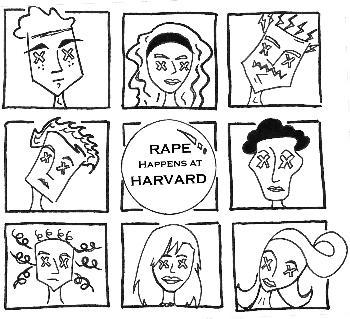
News
Summers Will Not Finish Semester of Teaching as Harvard Investigates Epstein Ties

News
Harvard College Students Report Favoring Divestment from Israel in HUA Survey

News
‘He Should Resign’: Harvard Undergrads Take Hard Line Against Summers Over Epstein Scandal

News
Harvard To Launch New Investigation Into Epstein’s Ties to Summers, Other University Affiliates

News
Harvard Students To Vote on Divestment From Israel in Inaugural HUA Election Survey
A New Campaign Against Sexual Assault

Rape happens at Harvard.
I remember the first time I was stopped short by this statement. I was sitting on the T during rush hour, looking around in that vaguely dreamy way most of us do when we’re using mass transit. The button on the young woman’s book bag next to me caught my eye. Rape happens at Harvard. She saw me staring, and gave me a guarded but friendly smile. I asked her about the button, and she told me that she put it there to remind people that even at Harvard, sexual violence is a problem. I told her I understood exactly what she meant, and that there remains much work to be done to change that fact. In my day to day efforts here, I have never forgotten the urgency in her voice, or her eyes.
For the last year, I’ve had the privilege of coordinating educational efforts to address sexual assault at Harvard. For those of you new to Harvard, some important recent history: the College has spent the last year considering how to effectively respond to this problem through the vehicle of the Committee to Address Sexual Assault at Harvard. This committee included Masters, senior tutors, counselors, deans and most importantly, two of your peers. Through an open invitation to the whole community, we listened and learned that indeed, there are many survivors of sexual violence in Harvard’s classrooms, laboratories, playing fields and common rooms. To the naked eye, they are typical Harvard students: high achieving, creative and heavily invested in contributing to the spirit and pulse of this place. They move through their lives inconspicuously, and in virtually every way, their Harvard experience is just like anyone else’s, with one exception: they have survived one of the most traumatic violations of safety and well-being imaginable. Chronic underreporting means we will never know exactly how many Harvard students lives are changed by sexual violence. The Department of Justice’s National College Women Victimization Survey found that nearly 5 percent of college women will be sexually assaulted each year. That means at least 330 Harvard students, every year—your classmates, friends, girlfriends and teammates. Men at Harvard who are victimized are even less likely to come forward, and their experiences are just as harrowing.
It would be easy to think this doesn’t concern us as a community. On its surface, rape seems to be a personal affair--a tragedy to be sure, but one that occurs in darkened rooms, concealed from the eyes and ears of the rest of us. Yet what we know to be true about rape is this: it flourishes in communities where silence is preserved at all costs, where most are reluctant to “get involved” by listening, intervening and supporting those who have experienced it. It flourishes when the prevailing belief is that it is overblown, no big deal, no one’s business and “not my problem.”
Like other social ills, the power of sexual violence seems to be diminished when communities come together to challenge it—to acknowledge its existence, and to stand up for those who experience it and to those who perpetrate it. The message must be that this has no place in our community, and we will not tolerate it. Student activists at Harvard have carried this message forward for years, and we are better off for their commitment and vision. When such silences are broken, faith is restored, shame is diminished, and healing can begin. It is in the spirit of community that I invite each of you to join in our efforts. Learn about sexual violence when it would be easier not to. Hear the voices of those who have survived it, even when their pain seems uncomfortably palpable. Move past the hyperbole of “it’s not my business” and engage with the issue personally as well as intellectually. Harvard students who have experienced sexual violence have repeatedly assured me, they do not want our pity. They want our solidarity, our compassion, and most of all, our action.
Together with my colleagues, Heather Wilson and Juan Carlos Arean, we are the Office of Sexual Assault Prevention and Response. This Office was established to provide confidential, professional support and resources for students, 24-hours a day, who have experience with sexual violence of any kind. We are equally committed to opening up dialogue, engaging students in understanding why it happens, and identifying ways we can collectively reduce its occurrence in our community. This year, the Class of 2007 will be asked to participate in discussions about ways that each of us can be part of the solution. We invite the rest of the College to follow suit. If you are tempted to think that this isn’t the proper domain of Harvard College, I would assert that we are very much in the business of ensuring every student’s right to learn, free of the fear of violence. Every violation of any member of our community exacts a price upon us all.
We believe that women and men, working together, can end sexual violence. We hope you will join us, so that one day, we might say Rape Happens at Harvard No More.
Susan B. Marine is the director of Harvard’s Office of Sexual Assault Prevention and Response.
Want to keep up with breaking news? Subscribe to our email newsletter.
